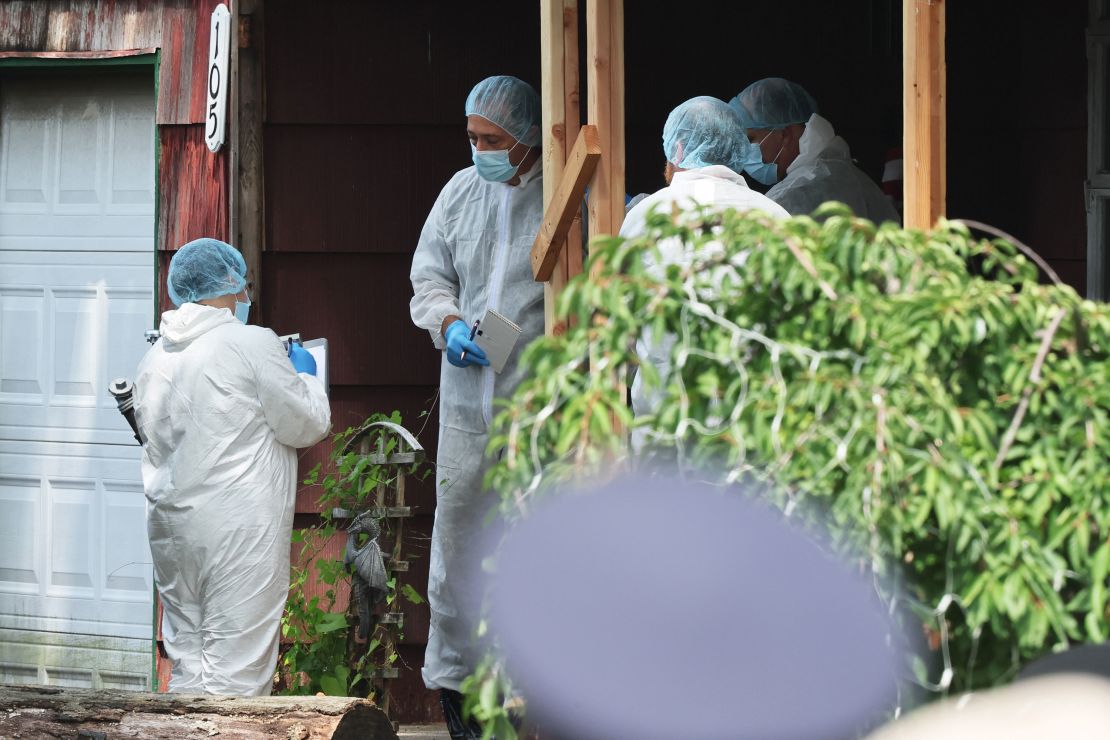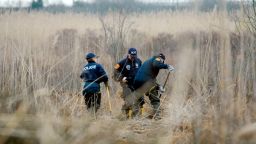Gilgo Beach serial killings suspect?Rex Heuermann?has now been charged with murder in the deaths of all four women who became known as the “Gilgo Four”?after their remains were discovered by investigators on Long Island in 2010.
Heuermann is charged with second-degree murder in the death of Maureen Brainard-Barnes, prosecutors said Tuesday. Brainard-Barnes was 25 years old when she was last seen in July 2007.
Heuermann pleaded not guilty to the new charge when he appeared in court Tuesday in a dark suit with his hands cuffed behind his back. His daughter and estranged wife, Asa Ellerup, were both present at the hearing.
Heuermann was taken into custody in July and charged with three counts of first-degree murder in the killings of Melissa Barthelemy in 2009, and Megan Waterman and Amber Costello in 2010. He pleaded not guilty to those charges last year.
The remains of all four women were found near Gilgo Beach within a few days of each other in 2010.
“The grand jury investigation of the so-called Gilgo Four is over, it has been concluded,”?Suffolk County District Attorney Ray Tierney told reporters after the hearing.
As the cases are prosecuted in court, the investigation will move into its second phase, Tierney said, where authorities will look into “the other bodies and the other murders, which we think are investigatively significant.”
Heuermann continues to maintain his innocence, his attorney Michael Brown told reporters after the court hearing. “He said, ‘I’m not guilty of these charges.’ He’s looking forward to fighting these charges,” Brown said.
Brainard-Barnes lived in Connecticut and was believed to be working as a sex worker when she went missing. The other three victims were also reportedly sex workers or escorts when they disappeared.
“Failing to afford sex workers access to justice sends a message to men who victimize them that the victimizers may never face consequences for their wrongful and criminal acts,” Attorney Gloria Allred, representing some family members of the victims, said at a news conference after the hearing. “This is 2024 – will there be justice for women who just needed some money to help support their children or themselves?”
Nicolette Brainard-Barnes was seven years old when her mother was killed.
“Her loss drastically changed the trajectory of my life,” she told reporters at the news conference. “There are countless times I needed her and she was not there.”
Nicolette said her mother used to read to her every night.
“I owe so much to my mom, and I know that she would want me to speak out for her in this process and let everyone know who she really was.”
New DNA evidence is revealed
Investigators found DNA belonging to Ellerup on a leather belt used to restrain Brainard-Barnes, according to an indictment.
Brainard-Barnes was restrained by three leather belts, one of which was used to tie her ankles together, the indictment states.
Brown said the nuclear DNA testing evidence prosecutors revealed Tuesday was “problematic.”
“All along we have been told that the evidence is unsuitable for nuclear DNA testing,” Brown said. “Miraculously, nuclear DNA testing and results have come forward.”
In 2010, a hair recovered from a belt buckle was unsuitable for DNA profiling and was sent to a forensic laboratory for further analysis prior to Heuermann’s identification as a suspect, the indictment states.
The laboratory recently was able to generate DNA sequencing data for the hair found on Brainard-Barnes, confirming a link with Heuermann, the indictment states.
The DNA profile is “7.9 trillion times more likely to have come from a person genetically identical to Asa Ellerup’s SNP genotype file than from an unrelated individual,” the indictment states.
“Nuclear DNA existed in the hair since they were first recovered in 2010 and now the science has caught up,” Tierney said. “I would say that’s a good break for justice, a good break for the investigation.”
Researchers also determined DNA extracted from female hairs that were recovered from the bodies of Waterman and Costello were “substantially more likely to have” come from a person with genetically identical DNA profiles to that of Heuermann’s wife and daughter, according to the indictment.
The technology used to determine the DNA evidence is “cutting edge” and “scientifically accepted in both the medical and forensic community,” Tierney added.
Ellerup was out of town when Brainard-Barnes disappeared, according to the indictment. And all four killings allegedly took place when Heuermann’s wife and children were traveling out of state, which allowed him “unfettered time to execute his plans for each victim without any fear that his family would uncover or learn of his involvement in these crimes,” according to the indictment.
“This?indictment?… again makes clear that Asa Ellerup and her children were not involved, even in the jurisdiction, when these murders took place,” Ellerup’s attorney, Robert Macedonio, said Tuesday.
Heuermann’s arrest last year came as a “surprise” to Ellerup and the children, Macedonio added.
“This life that existed, or may have existed, they were completely unaware of,” the attorney said. “She has no involvement in this and has never had any involvement in it.”
Authorities identified Heuermann as a suspect in early 2022 using cell phone data, witness descriptions and other information, and obtained a sample of his DNA from leftover crust in a pizza box he threw out.
Investigators also further connected Heuermann to Waterman by conducting advanced DNA testing on a piece of male hair found near her body and comparing it to DNA procured from the pizza leftovers, the indictment said.
More than 200 guns found at home
Less than six miles from where the remains were found, Heuermann had lived quietly with his family in the Long Island suburb of Massapequa Park for years.

He married Ellerup in 1996 and lived quietly with his daughter and stepson. Neighbors said the family mostly kept to themselves. Ellerup filed for divorce within a few days of Heuermann’s arrest, her attorney told CNN at the time.
When investigators turned the house upside down last summer, they found between 200 and 300 guns stashed in a walled-off vault locked behind a metal door. Authorities have also looked into properties Heuermann owns in South Carolina and Nevada.
Investigators recovered two burner phones from Heuermann at the time of his arrest that were used to contact sex workers, Tierney said Tuesday. Prosecutors were able to identify fraudulent email accounts and aliases Heuermann used to search for “torture porn” and information on the murder investigations and the victim’s families, he added.
Heuermann’s DNA was found on at least one of the bodies, Tierney previously said.
Heuermann’s internet history included at least 200 internet searches for information about the status of the Gilgo investigation, as well as compulsive searches for photos of the victims and their families, the district attorney said.
The Gilgo Four are among 11 sets of human remains found strewn across Long Island’s South Shore between 2010 and 2011, launching what police have called “one of the most consequential homicide investigations” in the island’s history.
This story has been updated with additional information.
CNN’s Nicki Brown and Artemis Moshtaghian?contributed to this report.






